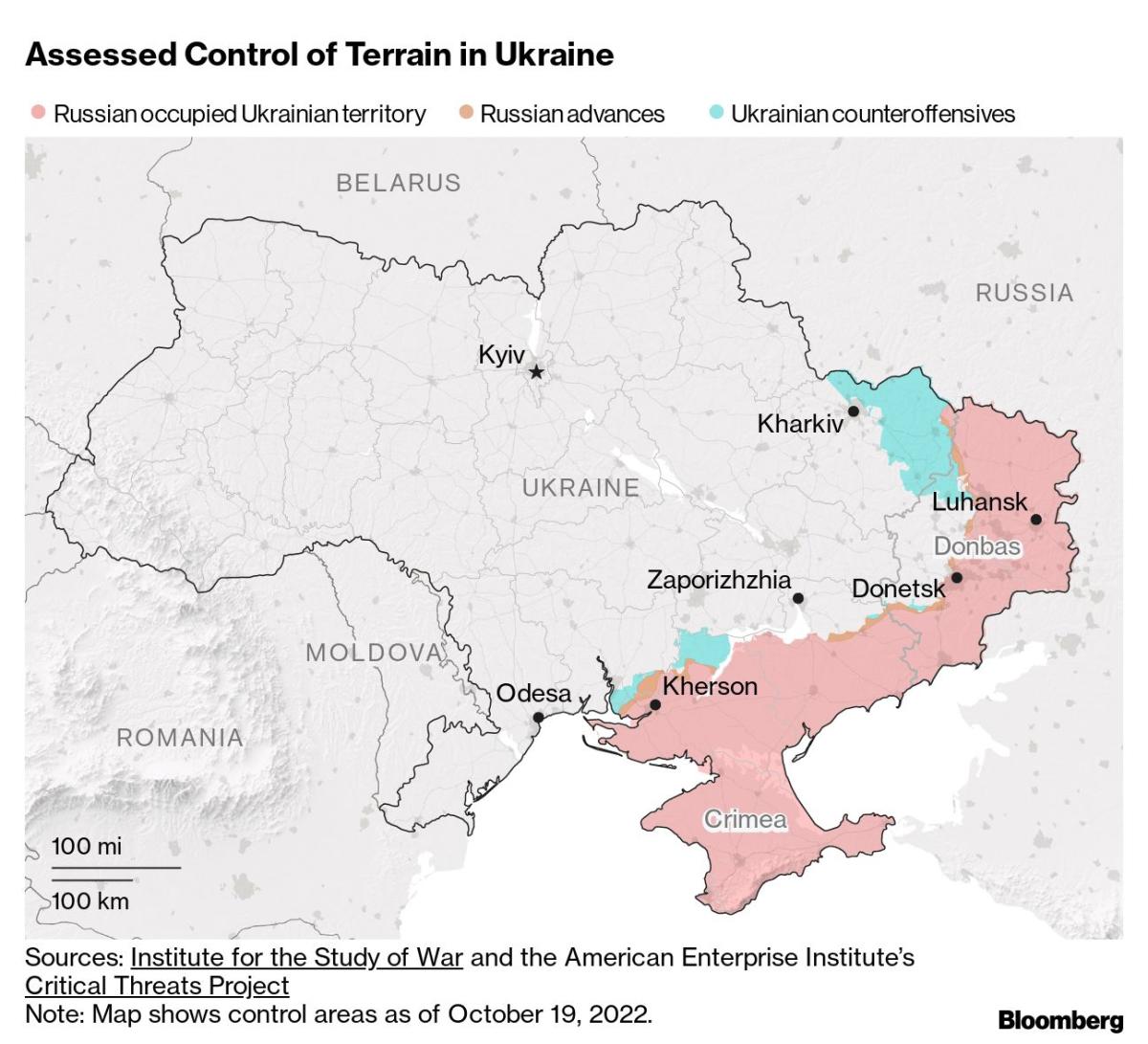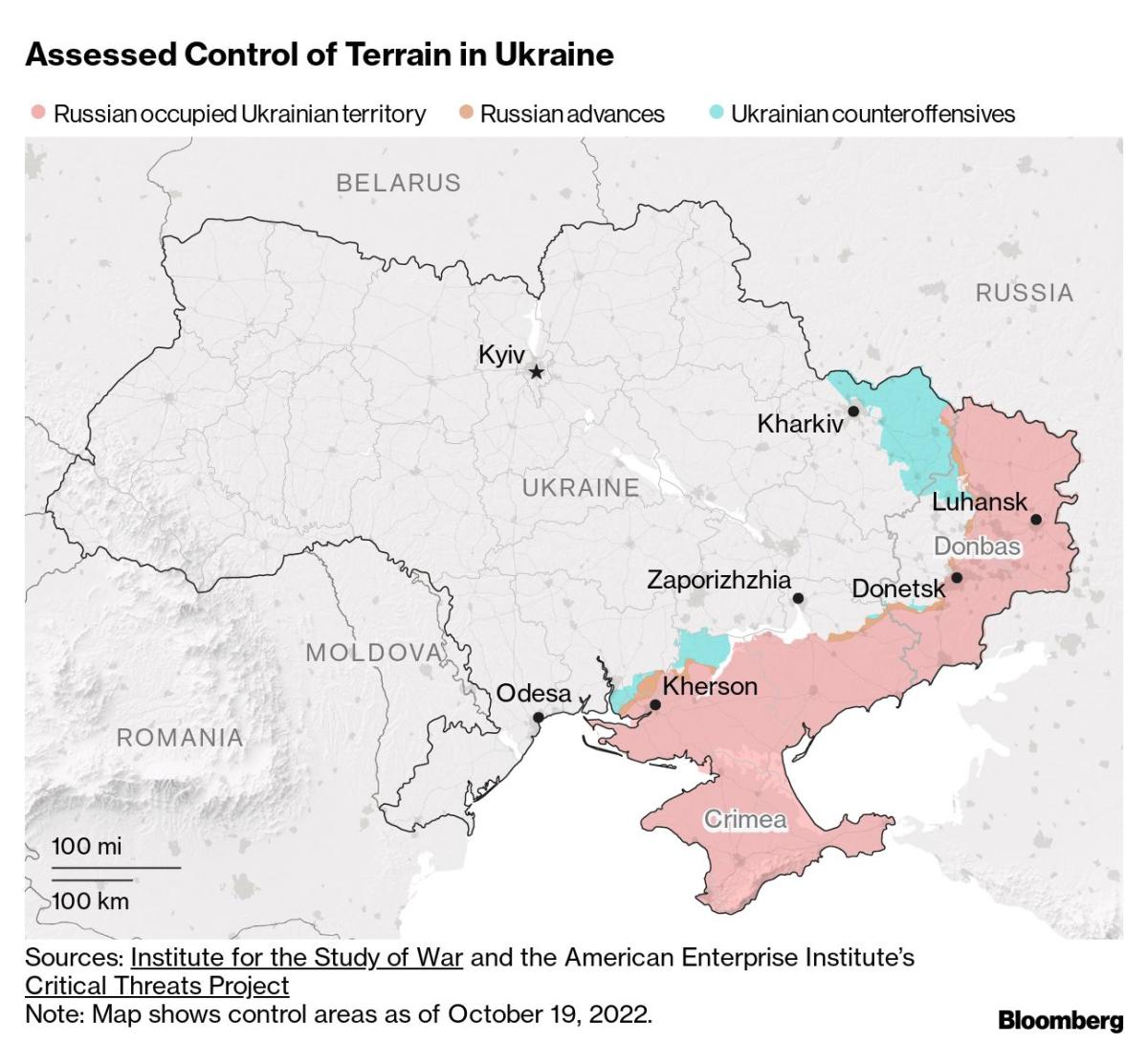
(Bloomberg) — Russia carried out military exercises simulating a retaliatory nuclear strike as President Joe Biden warned Vladimir Putin that any use of an atomic weapon would be an “incredibly serious mistake.”
Most Read from Bloomberg
As he oversaw the drills, Putin was told by his defense chief that the maneuvers on Wednesday were meant to simulate a “massive nuclear strike” in response to an attack, according to the televised remarks. The US had been notified that Russia would conduct the exercise in compliance with arms control obligations, the Pentagon said earlier.
“Russia would be making an incredibly serious mistake were it to use a tactical nuclear weapon,” Biden said on Tuesday. The president said he’d been in discussions about the possibility.
(See RSAN on the Bloomberg Terminal for the Russian Sanctions Dashboard.)
Key Developments
-
Biden Warns Russia Against ‘False Flag’ Nuke Attack in Ukraine
-
Biden Says Russia Has Given Cold Reception to Griner Diplomacy
-
One Missile Shook Ukraine’s Grain Trade. Another Might Kill It
-
Too Much Gas. Europe’s Energy Crisis Takes a Surprise Turn
-
What Is a ‘Dirty Bomb’ and Why Is Ukraine Worried?: QuickTake
On the Ground
Two people died and four were injured in a Russian missile attack on the city of Dnipro on Tuesday evening, local authorities said on Telegram. Over the past day, Russian forces launched five missile strikes, up to 30 air attacks and more than 100 multiple rocket launcher assaults, according to Ukraine’s General Staff. Ukrainian troops repelled attacks near nine settlements, including Bakhmut in the Donetsk region, and downed five Russian UAVs, the military said.
(All times CET)
‘Grom’ Nuclear Drills Involved Ballistic, Cruise Missiles (2:54 p.m.)
Russia’s nuclear exercises, known as Grom, included the launch of intercontinental ballistic missiles from Kamchatka in the Russian far east, ballistic missiles from the Barents Sea and cruise missiles fired from the air by strategic bombers.
Russian officials have denied they plan to use atomic weapons, while the Kremlin has accused Ukraine of planning to detonate a so-called “dirty bomb,” claims Kyiv and its allies have dismissed. Ukraine in turn has warned that Moscow could be preparing to explode a conventional weapon containing radioactive material and blame it on the Ukrainian side.
NATO Chief Calls Russia’s ‘Dirty Bomb’ Accusations Absurd (2:43 p.m.)
NATO Secretary General Jens Stoltenberg said Russian claims about a Ukrainian “dirty bomb” are “absurd.” Russia must not use a false pretext “to escalate the war further,” he told reporters in Brussels.
Stoltenberg said he would meet Turkish President Recep Tayyip Erdogan “in the near future” as he seeks quick ratification of bids by Sweden and Finland to join NATO — and reiterated that allies are ready to support Ukraine for “as long as it takes.”
“The stronger Ukraine is on the battlefield, the more likely we will have a political solution that ensures Ukraine prevails as a sovereign, independent nation in Europe,” Stoltenberg said.
Russia Airs Ukraine ‘Dirty Bomb’ Claims with China, India (12:51 p.m.)
Russian Defense Minister Sergei Shoigu spoke with his Chinese and Indian counterparts to discuss Moscow’s allegations that Ukraine is preparing to use a dirty bomb on its own territory.
The calls took place after Shoigu earlier this week contacted defense ministers in the UK, France and Turkey to make the same claims. The US and Russian defense chiefs also spoke twice in the space of three days.
Kremlin spokesman Dmitry Peskov said his country has “information” about the threat, which it’s shared, including at the United Nations Security Council. Ukraine has denied the accusations, suggesting that Russia itself is planning to explode a dirty bomb and blame it on Kyiv.
Estonia Sets Up Preventative Measures for Civilians (12:28 p.m.)
Estonia is procuring air-raid sirens and designating public facilities as bomb shelters in order to better defend its civilian population in potential wartime situations.
The Baltic nation, formerly annexed by the Soviet Union and among the most vocal critics of Moscow’s invasion of Ukraine, said it signed an agreement with Slovakia-based Telegrafia AS to procure warning sirens in 22 towns and cities. The country is also rolling out more barbed wire fencing on its border with Russia.
While investing more per capita in its military than most other NATO members, Estonia says its citizens are poorly defended against potential military conflict and natural catastrophes.
Maritime Traffic in Ukraine Crop-Export Corridor ‘On Hold’ (10:59 a.m.)
Two vessels were dispatched to check the area where a suspicious object was reported in the Black Sea’s grain-export corridor, Ismini Palla, UN spokeswoman for the Black Sea Grain Initiative, said by email. Traffic has “been put on hold for today,” she said. Findings will be reported to the initiative’s Joint Coordination Centre later in the day.
The suspicious object was reported earlier Tuesday by a vessel in the area. The finding risks further disrupting crop exports from Ukraine, which have already been slowed by a lengthy vessel-inspection holdup in Istanbul. The crop-export deal that revived Ukraine’s seaborne trade is up for renewal in mid-November, and officials have yet to verify an extension.
Ukraine’s Counteroffensive Slows on Weather (10:17 a.m.)
Defense Minister Oleksii Reznikov said his country’s counteroffensive has slowed as rainy conditions make it harder to move military equipment.
The rainy weather “makes us a little bit slower” but we are taking our area back by “meters and kilometers, step-by-step,” he said in an interview with Fox News. “And we will continue to do it.”
He said Russia’s troops are not ready for street fighting in the southern city of Kherson, where they are facing issues with military supplies after the Ukrainian army repeatedly hit bridges linking Kherson and the left bank of Dnipro river, occupied by Russian forces.
Ukraine Limits Power in Some Regions (9:07 a.m.)
The national electricity grid operator Ukrenergo limited power deliveries to consumers in a wide swathe of Ukraine’s central and eastern regions. The move should “ease the burden on the grid to ensure a sustainable balance of the energy system and to avoid repeated accidents after electricity lines were damaged by Russia’s missiles shelling,” the company said on Telegram.
A day earlier, Deputy Prime Minister Iryna Vereshchuk made a plea to Ukrainians who fled the country because of the invasion. “You see what Russia is doing, the grid cannot withstand” such pressure, she said on television. “If you have an opportunity to spend the winter abroad, it is worth doing that.”
Russia Flags Regular Nuclear Drills (1:50 a.m.)
Russia notified the US of plans to hold its “routine annual exercise” in compliance with arm control obligations, Pentagon spokesman Brigadier General Patrick Ryder said.
Russia held the drills in February this year, shortly before it invaded Ukraine. The exercises, known as Grom, or “thunder,” traditionally take place in October, involving submarines, planes and missiles, but were skipped in 2021 due to the Covid pandemic.
“That is something that we will continue to keep an eye on,” Ryder said.
Most Read from Bloomberg Businessweek
©2022 Bloomberg L.P.




